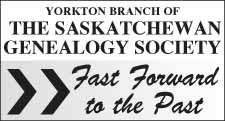Fast Forward To The Past (for July 10, 2013)
During your summer travels doing genealogy research, your path may take you past small country churches. These churches are now the focus of the "Sanctuary Project" being conducted by the University of Alberta, with volunteers in Saskatchewan.
The Sanctuary Project is explained in detail at www.ualberta.ca/CIUS/religion-culture. Click on the "Sanctuary" tab. To quote from their website, "The Sanctuary project wants to make sure that Ukrainian sacral culture on the prairies is well documented for future scholars. We do not know how much of the material aspects of that culture will still be standing a generation from now. Some churches are in disrepair and others no longer exist. Our rural communities are shrinking - some parishes have only half a dozen families. Not all these buildings can be preserved physically, but we can at least make sure that they have been carefully recorded."
John-Paul Himka, professor of history at the University of Alberta, explains who has been working on the project. "The principal investigators are three professors from the University of Alberta: John-Paul Himka (professor of history, with a specialty in Ukrainian history and Ukrainian iconography), Natalie Kononenko (professor of folklore, with a special interest in rituals), and Frances Swyripa (professor of history, with a specialty in Ukrainian Canadian history and how ethnic sacralities transform space). The project was first discussed by Frances and me in July 2007. We organized a workshop in January 2008, in which participants from across Canada brainstormed. At this time Natalie joined us as a principal investigator. We began photographing in June 2009. We began systematic interviewing of parishioners the following year. We have a network of young fieldworkers. They help with the photography and processing the photos for our database."
A great number of churches have been recorded so far. "A count of churches is difficult, since sometimes only a cemetery is left, or a church is deteriorating and sinking into the land, or a church is closed and emptied so we can only do exteriors, etc. But as a ballpark figure, I would say we have done about 250." says John-Paul. "We do church cemeteries in Saskatchewan and in parts of Alberta not covered by the Alberta-Ukraine Genealogical Project."
A project of this magnitude will take time. John-Paul gives the following estimate. "We figure we have three more summers of photography and interviewing ahead of us, through 2017. Then maybe a year of final tweaks and the project should be done. .. Eventually, when we finish the project (2017 or 2018), all our photos and interviews and other information will be available to the public through the University of Alberta Peel's Prairie Provinces digital collection."
When asked if the team can use volunteer help, John-Paul replied "We have taken volunteers, but generally we find it best to work with the trained team. We collect information on Ukrainian churches. If anyone has old pictures or good parish contacts, these are useful to us, but we have done about 40% of Saskatchewan already and most of Alberta." People who have information can contact John-Paul. "If people have questions, it is best to email me at [email protected]." This is a fascinating project for those interested in genealogy.
The Yorkton branch of the Saskatchewan Genealogy Society always welcomes members at any stage of genealogy research. No matter where you are on your quest, remember that every family has a story: discover yours with the Yorkton Genealogy Society. For more information on the Society call Dave at 783-1093 or Glenn at 782-7969.
submitted by
Debbie Hayward




